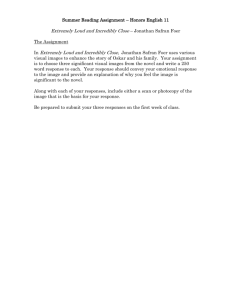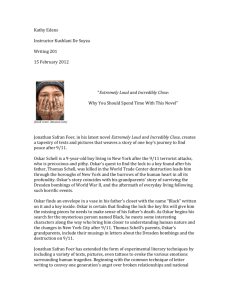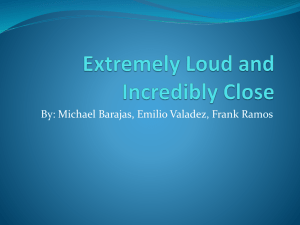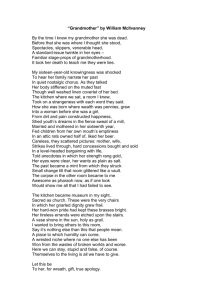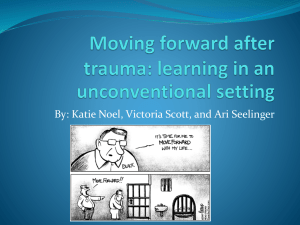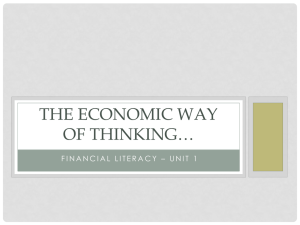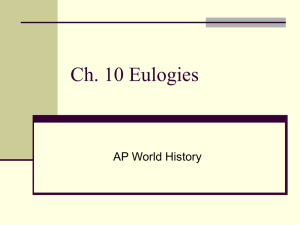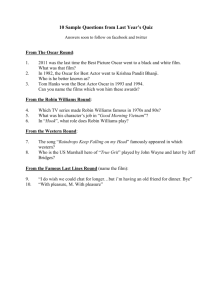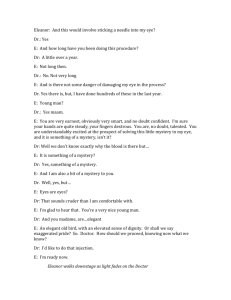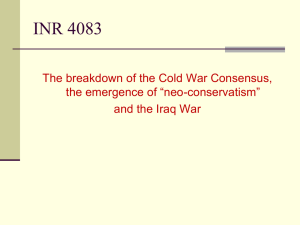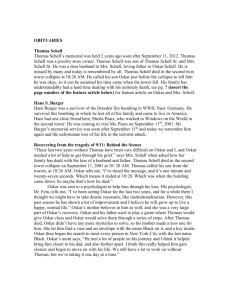discussion/lecture/questions week 4
advertisement
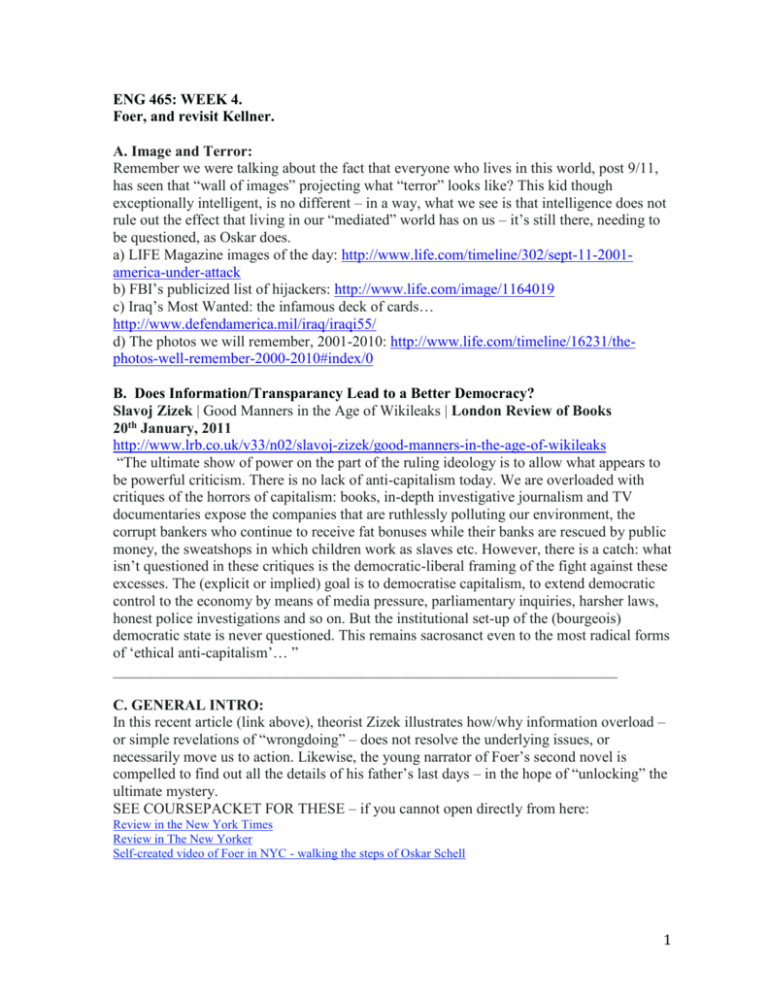
ENG 465: WEEK 4. Foer, and revisit Kellner. A. Image and Terror: Remember we were talking about the fact that everyone who lives in this world, post 9/11, has seen that “wall of images” projecting what “terror” looks like? This kid though exceptionally intelligent, is no different – in a way, what we see is that intelligence does not rule out the effect that living in our “mediated” world has on us – it’s still there, needing to be questioned, as Oskar does. a) LIFE Magazine images of the day: http://www.life.com/timeline/302/sept-11-2001america-under-attack b) FBI’s publicized list of hijackers: http://www.life.com/image/1164019 c) Iraq’s Most Wanted: the infamous deck of cards… http://www.defendamerica.mil/iraq/iraqi55/ d) The photos we will remember, 2001-2010: http://www.life.com/timeline/16231/thephotos-well-remember-2000-2010#index/0 B. Does Information/Transparancy Lead to a Better Democracy? Slavoj Zizek | Good Manners in the Age of Wikileaks | London Review of Books 20th January, 2011 http://www.lrb.co.uk/v33/n02/slavoj-zizek/good-manners-in-the-age-of-wikileaks “The ultimate show of power on the part of the ruling ideology is to allow what appears to be powerful criticism. There is no lack of anti-capitalism today. We are overloaded with critiques of the horrors of capitalism: books, in-depth investigative journalism and TV documentaries expose the companies that are ruthlessly polluting our environment, the corrupt bankers who continue to receive fat bonuses while their banks are rescued by public money, the sweatshops in which children work as slaves etc. However, there is a catch: what isn’t questioned in these critiques is the democratic-liberal framing of the fight against these excesses. The (explicit or implied) goal is to democratise capitalism, to extend democratic control to the economy by means of media pressure, parliamentary inquiries, harsher laws, honest police investigations and so on. But the institutional set-up of the (bourgeois) democratic state is never questioned. This remains sacrosanct even to the most radical forms of ‘ethical anti-capitalism’… ” ___________________________________________________________________ C. GENERAL INTRO: In this recent article (link above), theorist Zizek illustrates how/why information overload – or simple revelations of “wrongdoing” – does not resolve the underlying issues, or necessarily move us to action. Likewise, the young narrator of Foer’s second novel is compelled to find out all the details of his father’s last days – in the hope of “unlocking” the ultimate mystery. SEE COURSEPACKET FOR THESE – if you cannot open directly from here: Review in the New York Times Review in The New Yorker Self-created video of Foer in NYC - walking the steps of Oskar Schell 1 The Key, the envelope, the locks of possibility (38). In NY alone, how many locks (41)? What that mystery (that the key might unlock) might be, and what he hopes that mysterious key might reveal to him are the subject of this book. IF young Oscar finds out what the key leads to – what door it will unlock, will this help him unravel some mystery? Will the contents behind the lock reveal what he wants? Is knowledge hidden (once revealed/known) = release from ignorance/peace in our new-found all knowing state? Will unlocking that mystery door possibly help move him (Oscar) to an action beyond the static state in which he now finds himself – the sate of forever grieving, maintaining an open wound that he believes memorializes/embalms his father’s existence properly? 1. Within the first pages, we learn that he is an “exceptional” child – precocious, superintelligent, and a sweet-but-impossible personality. He continues an “internalized” narrative with himself. Constantly inventing, wondering, questioning. In a way, the author HAS to make him hyper-intelligent. Why/what do you think? Later, we learn where he was, on the day his father was trapped – listening at home to the messages his father was leaving (completely paralysed) p. 68. 2. p. 2. “I was interested in self-defense, for obvious reasons” – why obvious, for a 9 year old? 3. p. 3. Thinks about the dead – more people alive now that there has ever been dead in all of history. 4. A) GRANDMOTHER: What is relationship with his grandmother like 69-74; 100-105? B) MOTHER: Loves his mother, thrilled to make her happy with a special bracelet (7, 35); but worried his mother does not love him (6) – rather that he died, not his father? Angry with her, too, for not “adding to the Reservoir of Tears” (52). 5. What was his relationship with his father like? P. 7-10 father explains to him: we are intellectual equals – I’ve just been alive longer. What does telling someone that do for you/them? P. 8: And: “If you don’t tell me anything, how do I know I’m right?” This also means he can never be “wrong.” For instance, I know that I know somewhat more than you about theory/some books because I’ve been alive longer/therefore had time to read more. What does knowing that/declaring that do? 6. He begins writing letters –a few weeks after the “worst day”. Who does he write to? What do these letters tell us? He also (compulsively) collects things for his book of Things That Happened to Me (47-68). Why? What does this desire to archive, collect, record tell us? (I’ve heard that Nelson Mandela is also a “compulsive archiver” – I thought perhaps it’s partly to do with knowing that his life has significance on a global scale, and knowing death is nearby, he wants to ensure that his life is “correctly” recorded – he’s famous for wanting to ensure that he’s portrayed warts and all – affairs, flaws, and foolish decisions included.) 7. BUT: enter RON (35). How does he feel about mum’s Scrabble-playing with Ron, listening to music louder than “necessary”, looking in the mirror, laughing? Why is this not 2 “fair” to him/father? What does playing games, looking in the mirror, laughing signify? 8. Thomas Schell’s wardrobe is still there p. 36. In fact, everything – including the tuxedo he draped out on a chair – are still laying “in state” – what does this mean? (it’s like a long, continual funeral – he’s dead/not yet buried…) SO: Where are they in their grieving? What’s going on here? See 102: the storage locker with all he kept – even a “$3 razor” that Oscar does not want to throw away. 9. a) His compulsions: what’s this about? He’s “nervous about Arab people on the subway” and in restaurants and in public places. Also bags, shoes, people with mustaches, smoke, knots, tall buildings, turbans. b) He hurts himself (bruises 69); and continually “invents” (69)/can’t sleep: it’s like I’m a beaver – I can’t stop, because my teeth won’t stop growing…not because they want to build dams (36-7; 69). c) What does he say makes him sad – what can he identify as the causes behind his anxiety/sadness (things he cannot control – leads to anxiety, and therefore, compulsions) p. 42.? * “Our insignificance” – and the possibility of affecting the universe, anyway, espite the futility and insignificance (86). d) Thusly are Quests born: “Even if it were relatively insignificant, I needed to do something, like sharks, who die if they don’t swim” – so his quest to track down all Blacks in the 5 boroughs of NY is…a quest to shift a grain of sand in the desert…(86-7). What does he carry on his Black Quest 87? Fig Newtons AND iodine pills, in case of a dirty bomb… 10. We have the meetings of the Blacks: p.88 – the first Black. He walks (afraid of subway), shaking his tambourine the whole time…then, Abby Black (90). 11. THEN: we have letters – out of the course of the general narrative… GRANDFATHER’S LETTERS: a) Written in 1963. These are Thomas Schell Sr. (Oscar’s Grandfather)’s words to his son (O’s father). pp. 16- 18 - we’ll understand more later… * He writes about losing words…how words became “locked” inside him…this is when he begins writing. * He gets “YES” (left)/ “NO” (right) tattoos on his hands p. 17. * “I was already out of words when I met your mother. That may have been what made our marriage possible” (28): they met at the Columbian Bakery on Broadway…arriving in NY broken, confused, alone. b) Meeting Anna: the story (113-17; 126-128) – they were walking towards each other, and past each other the whole time. c) 108-111 – what his marriage to Anna’s sister was like…the “so many rules they had to follow”; the spaces they created for each other – the Nothing and Something spaces; the magazines he brought home from the transit bus to the airport – his shoulders “burned with English”; How much he loved the airport – the reunions (I’m waiting to see someone I know get off the planes) – the end of missing someone. 3 d) He’d hoped marriage to Anna’s sister would be like a reunion, but they ran with their arms outstretched, but not toward each other” (109). e) He sets her up with a typewriter, paper, and a desk to write – he hopes words will help her not suffer alone. BUT: pages are blank…and more blank….he pulled out the ribbon long ago, and forgot (124). f) He decides to leave – for Dresden – 135-141. GRANDMOTHER’S LETTERS (more present day): b)We also read a letter from his grandmother: 12 September, 2003 (2nd anniversary of her son’s death). * it’s about her girlhood: receiving a letter from a Turkish Prisoner in a Labour camp; how she asked everyone she knew to write her a letter – but never wrote the prisoner back (7579). * She pored over magazines to learn “American”: “I only wanted to be natural. I gave up on that.” (79-80). * How she ran into her sister’s first love – seven years after the bombing f Dresden (81). * He is now the Man who Cannot Speak. He attempts to sculpt her – but can only sculpt Anna (83). * Compromises after loss - not love (voluntary attachment), but “need” (non-voluntary attachement): All she wants is “an acceptable compromise” – I didn’t need to know if he could love me: I needed to know if he could need me” 84. __________________________________________________________________________ C. AND: Some people really don’t like the book: Extremely Cloying & Incredibly False Why the author of Everything Is Illuminated is a fraud and a hack By Harry Siegel http://www.nypress.com/article-11418-extremely-cloying-incredibly-false.html Why do people wonder what's "OK" to make art about, as if creating art out of tragedy weren't an inherently good thing? Too many people are too suspicious of art. Too many people hate art. —Jonathan Safran Foer, on why he wrote a 9/11 book. Call me a hater, then. 4
